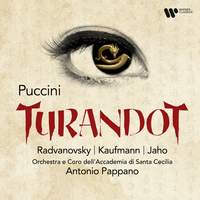Recording of the Week,
Antonio Pappano conducts Puccini's Turandot
Although no stranger to Puccini, a work that Antonio Pappano has resisted conducting until now is the composer’s last opera, Turandot. However, he has given in to temptation to present an opulent, gloriously-sung account that has been most certainly worth the wait.
 Sondra Radvanovsky as Princess Turandot sets out her impressive stall with her opening aria from Act Two, “In questa reggia”: from the first few imperious bars to the flashes of anger and pain as she speaks of the horrendous treatment inflicted upon her ancestor, Lou-Ling, it’s a nuanced performance that brings sympathy and depth to a potentially inscrutable character.
Sondra Radvanovsky as Princess Turandot sets out her impressive stall with her opening aria from Act Two, “In questa reggia”: from the first few imperious bars to the flashes of anger and pain as she speaks of the horrendous treatment inflicted upon her ancestor, Lou-Ling, it’s a nuanced performance that brings sympathy and depth to a potentially inscrutable character.
As Calaf, the Unknown Prince who attempts to win Turandot’s hand (thereby risking his own death if he fails to answer her three riddles), Jonas Kaufmann offers plenty of subtlety and shading, from his comforting tone in “Non piangere, Liù” to the ardent self-confidence of the riddle scene, and finally Act Three’s “Nessun dorma”, with a magnificently ringing high B at its climax. The build-up to this latter aria is spellbindingly done by Pappano and the Santa Cecilia orchestra, restlessly surging amid the distant calls of the heralds (commandingly sung by the chorus tenors), announcing that “none shall sleep” until the name of the mysterious prince has been discovered.
The rest of the cast are uniformly superb also, not least Ermonela Jaho as Liù, touching in her concern for Calaf in “Signore, ascolta!” and heartbreaking in “Tu che di gel sei cinta”, plus the jolly stylings of Ping, Pang, and Pong in the opening scene of Act Two, where their darkly comic interactions as they remark upon how many would-be suitors to Turandot have been executed are placed against passages of tender wistfulness as they reminisce about the simplicity of their lives before Turandot came along.
The subsequent shift into the second scene of Act Two is splendidly done, with pomp from the brass and an ecstatic paean from the chorus as they proclaim their hope that the Emperor may reign for ten thousand more years. For all the rousing singing on display, I should not neglect the contribution from the Santa Cecilia orchestra and moreover the guiding hand of Pappano: his pacing is spot-on throughout, bringing a majestic sweep to the end of Act One whilst allowing the more reflective moments the space to breathe.
Speaking of Emperor Altoum, the luxury (if somewhat unexpected) casting of Michael Spyres in the role works brilliantly: as demonstrated by albums such as Baritenor and the forthcoming Contra-Tenor, Spyres is a true vocal chameleon, able to adapt his performance to the needs of the part. Here he complements and yet contrasts with Kaufmann’s timbre so that you’re never in doubt as to which tenor you are listening to at any given point.
 As if all of that weren’t enough, Pappano has one further ace up his sleeve. Turandot was actually left unfinished by Puccini, with the final duet between Turandot and Calaf largely existing only as sketches. The task of completing the opera fell to Franco Alfano and, although there have been other attempts since then (most notably by Luciano Berio in 2001), it is his ending that is performed 99% of the time. However, Alfano’s original submission was heavily criticised by both Puccini’s publisher, Ricordi and conductor Arturo Toscanini, with the latter insisting that about five minutes be cut out, and it is this shorter version that is normally heard today.
As if all of that weren’t enough, Pappano has one further ace up his sleeve. Turandot was actually left unfinished by Puccini, with the final duet between Turandot and Calaf largely existing only as sketches. The task of completing the opera fell to Franco Alfano and, although there have been other attempts since then (most notably by Luciano Berio in 2001), it is his ending that is performed 99% of the time. However, Alfano’s original submission was heavily criticised by both Puccini’s publisher, Ricordi and conductor Arturo Toscanini, with the latter insisting that about five minutes be cut out, and it is this shorter version that is normally heard today.
For this recording, Pappano has reinstated Alfano’s original completion, and it makes for quite a different experience. It has been suggested that the reason Puccini had difficulty finishing the work was that he could not find a satisfactory way to reconcile the abrupt shift from the tragedy of Liù’s death to the impassioned ardour of the love duet. Although Alfano’s first attempt is far from perfect and undoubtedly still problematic, by extending several passages considerably it makes for a smoother change in Turandot’s emotions as she eventually submits to Calaf’s declarations of love. Furthermore, while I don’t wish to spoil all the surprises for people who haven’t heard this version before, suffice it to say that the very end of the opera, with more extended contributions from soloists, chorus, and blazing trumpets, makes for an utterly thrilling conclusion, and it’s wonderful to have this version available in such a marvellous recording.
Sondra Radvanovsky (Turandot), Jonas Kaufmann (Calaf), Ermonela Jaho (Liù), Michele Pertusi (Timur), Michael Spyres (Altoum), Mattia Olivieri (Ping), Gregory Bonfatti (Pang), Siyabonga Maqungo (Pong), Orchestra e Coro dell'Accademia Nazionale di Santa Cecilia, Antonio Pappano
Available Formats: 2 CDs, MP3, FLAC, Hi-Res FLAC



